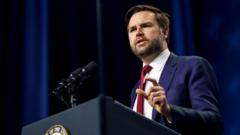US Vice-President JD Vance is set to embark on a notable visit to Italy this Friday, where he will engage with Prime Minister Giorgia Meloni and other officials. However, a crucial and informal highlight of his trip is his desire to meet Pope Francis, the revered leader of the global Catholic Church. Vance, who converted to Catholicism in 2019, aims to establish a connection with the pontiff, whose philosophies may serve to bolster his political aspirations.
According to insiders familiar with Vance’s agenda, his potential meeting with Pope Francis is laden with symbolic significance, particularly in the context of Easter celebrations. Such an encounter could signal a renewed relationship between the Vatican and the White House, especially following months of tension over sensitive issues including migration policies. The Pope's strong stance on the importance of humane treatment towards those fleeing peril reflects a radically different view from some U.S. immigration strategies.
Father Roberto Regoli, a theology expert, opines, "The meeting between Pope Francis and JD Vance stands as a representation of two significant global Catholic figures—the Pope as the head of the Church and Vance as a prominent layman in American politics." A formal conversation with the Pope would be a substantial win for Vance, particularly as it aligns with Pope Francis's inclusive approach towards divergent ideologies.
While the Vice-President's office and the White House remain tight-lipped regarding the potential meeting, the Vatican has withheld confirmation of any discussions. Pope Francis has recently faced health challenges but has begun to make sporadic public appearances, such as a brief meeting with King Charles III in Italy last week.
Beyond the papal encounter, Vance's itinerary includes a confirmed meeting with Prime Minister Meloni. Politically aligned with the U.S. on matters pertaining to immigration, Meloni can provide insights crucial to Vance’s interests in maintaining ideological connections throughout Europe. In light of their collaboration, the presence of Italy’s deputy prime ministers during this meeting signifies the increasing interlinks between American and European populist agendas.
Vance's diplomatic mission arrives after a previous critique of European leaders during the Munich Security Conference, where he asserted they had neglected free speech and public sentiment regarding migration. His positions have drawn scrutiny, especially within the context of Catholic teachings that call for compassion towards displaced populations. U.S. bishops have previously rebuked aggressive immigration policies that oppose core Christian values.
Analysts highlight that if Vance successfully meets Pope Francis, it could simultaneously elevate his public image as a Catholic leader aligned with the Church's moral principles. Vance’s journey to Catholicism came later in life, as he recounted seeking a religious framework to navigate complex societal challenges, a narrative echoed in his memoir, *Hillbilly Elegy*.
In culmination, Vance’s aspirations to secure a photo-op with Pope Francis not only have personal and political dimensions but may also reflect an opportunity for the pontiff to showcase his commitment to dialogue—regardless of political divergence—further strengthening his role as a unifying religious figure during a tumultuous time.




















